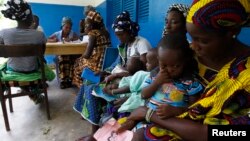WASHINGTON —
UNICEF, the United States and the governments of India and Ethiopia have issued a call to action - a new initiative to save the lives of hundreds of thousands of mothers and their children who die each year from preventable causes.
Called “A Promise Renewed,” the strategy was unveiled Wednesday at a conference in Washington.
“[We are] intensifying our efforts, building on our progress to date in strengthening the supply of services and commodities, and, less well-recognized, enhancing demand - increasing the capacity of poor and disadvantaged people to access these services,” said UNICEF Executive Director Anthony Lake in outlining the initiative's goals.
Each year, more than 6 million children under the age of five die of preventable causes - about 98 per every 1,000 births globally, according to USAID, the U.S. government’s aid agency. That’s down nearly 50 percent from 1990, but under the new initiative, the goal will be fewer than 20 deaths out of 1,000 births by 2035.
At Wednesday’s conference, Ethiopia’s minister of health, Kesetebirhan Admasu, said African nations have reduced the under-five mortality rate by 53 percent. That, he said, is still not enough.
“It is important to remind ourselves that one in every 13 children continues to die before the age of their fifth birthday in Africa,” Admasu said. “This is an urgent reminder for us to intensify our efforts.”
USAID says its action plan could save the lives of 15 million children and as many as 600,000 women by 2020.
The agency will focus its efforts on 24 nations with high death rates for mothers and their children. These include India, Pakistan, Nigeria, Ethiopia and the Democratic Republic of Congo, which together account for about half of all early childhood deaths.
USAID will spend $2.9 billion in this effort. Rajiv Shah, USAID’s director, told VOA the call to action will build on successful tactics for helping women and children, including improving access to health care and nutrition information.
"We are helping to train health community workers so that they know how to help women and children gain access to medicines when they need them,” Shah said. “We are helping to distribute misoprostol, which helps to prevent post-partum or post-birth bleeding amongst women - that is still the No. 1 cause of maternal death in South Sudan."
Shah said finding new ways to work with local governments and businesses can cost effectively improve the lives of women and their children even as many countries face financial constraints.




